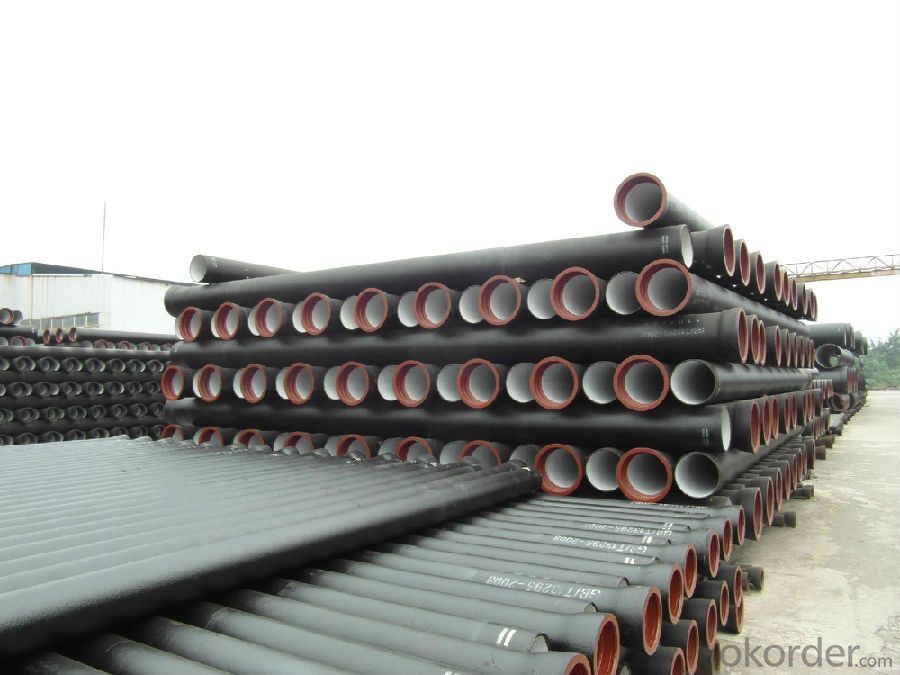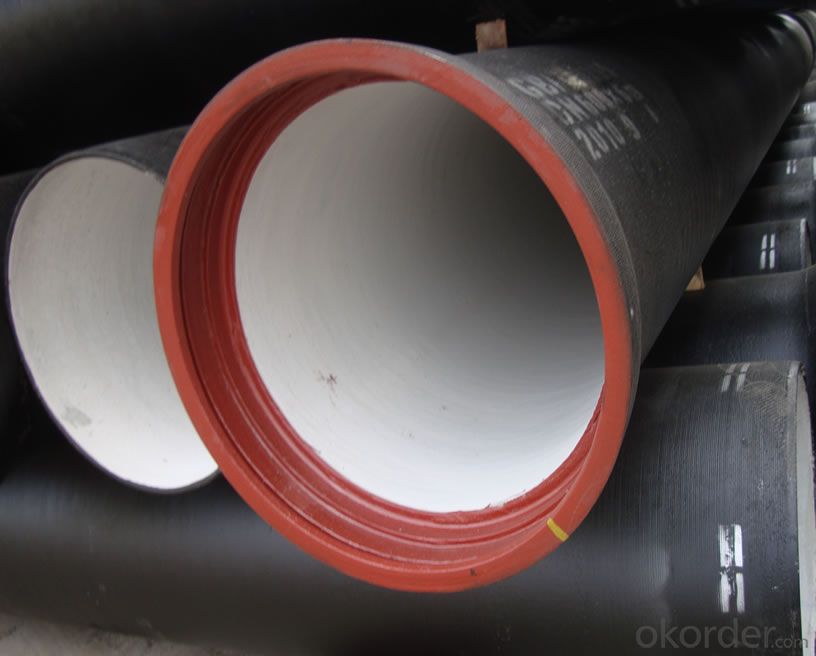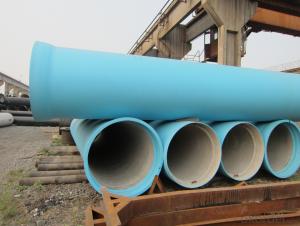Ductile Iron Pipe of China EN545 DN200-DN1000 High Quality
- Loading Port:
- China main port
- Payment Terms:
- TT or LC
- Min Order Qty:
- 20 m.t.
- Supply Capability:
- 100000 m.t./month
OKorder Service Pledge
OKorder Financial Service
You Might Also Like
1,Ductile Iron Pipe Description :
1) Pipes confirm to ISO2531,K9 class,T type joint,6m long,with inside cements lining conform to ISO4179, outside Zinc spraying(130g/m2) and bitumen coating(70μm) conform to ISO8179.
2) Pipe ends: Spigot and socket ends, with 100% SBR rubber gaskets accoding to ISO4633
3) we can do third party inspection according to customer's request.
4) Our products have been sold to many international market, such as Middle East and South East Asia and Africa.
2,Main Features of the Ductile Iron Pipe:
1. Material: Ductile iron grade 500-7/ 450-10 in accordance with ISO1083
2. Standard: ISO 2531, EN545, EN598, ANSI, AWWA
3. Certificate: ISO9001, ISO14001, SGS, NSF, WRAS
4. Test: In accordance with ISO 2531 / EN 545 / EN598 and 100% water pressure test
5. Length: 6m or cut into 5.6m, 5.7m, 5.8m
6. Internal Lining: Cement, conform to ISO4179
7. External coating: Zinc + Bitumen, conform to ISO8179
8. Rubber: NBR, SBR, EPDM according to ISO4633 / EN681.1
9. Note: The gaskets, bolts & nuts are supplied respectively as your special requirement
3,Ductile Iron Pipe Images:


4. Ductile Iron Pipe Specification
Place of Origin: China (Mainland)
Model Number: DN80-1600
Length: 6M/5.7M/NEGOTIATED
Standard: ISO2531 / EN545
Application: Potable/Sewage Water
Diameter: DN80-1600
Shape: Round
Hardness: 230
Pipe Wall Thickness: standerd
Pull Strength: 420
Yield (≥ MPa): 300
Material: Ductile Iron
water ductile iron pipe: SO2531 / EN545 DI pipe
Processing service: Beveling, Threading, Slotting, Cut-to length, Bends, Quench and Temper, Fabrication, Double-jointing and On-site assistance
Documentary: MTC, material certification,Origin certification, CI or PI,Test Report, export licence, handling order, B/L,insurance policy,shipping instructions, contract, packing list etc.
5.FAQ:
We have organized several common questions for our clients,may help you sincerely:
1.Q: Why would you choose ductile iron pipe rather than other pipe materials?
A:The reasons are obvious for that not only ductile iron pipe possesses the inherent strength and flexibility of ductile iron, combined with proven corrosion protection systems, but also the cost savings can be achieved from design to installation and commissioning.
2.Q:Why can you guarantee the inner of pipes can’t be corroded?
A: High alumina cement mortar lining and sulphate-resistant cement mortar lining. These two special linings are applicable to inner anti-corrosion for sewage pipes, improving resistance to erosion of the sewage components.
- Q:Ductile iron pipe length is generally much
- The water-cooled metal ductile iron pipe has a single length of 6 meters, and the current mainstream ductile tubes are water-cooled metal ductile iron pipes.
- Q:How are ductile iron pipes protected against stray current corrosion?
- Ductile iron pipes are protected against stray current corrosion through the implementation of various preventive measures and protective coatings. Stray current corrosion occurs when an electric current passes through the pipe, leading to accelerated corrosion and potential damage. To prevent this, the following measures are typically adopted: 1. Electrical isolation: Ductile iron pipes are electrically isolated from other metallic structures using insulating materials, such as rubber gaskets or non-conductive coatings. This isolation prevents the flow of stray current through the pipe, minimizing the risk of corrosion. 2. Cathodic protection: Cathodic protection is a widely used technique to protect ductile iron pipes from stray current corrosion. It involves the installation of sacrificial anodes or impressed current systems near the pipe. These anodes or systems release a controlled electric current, which counteracts the stray current and ensures that the iron pipe remains cathodically protected. 3. Coatings: Ductile iron pipes are typically coated with protective layers to enhance their resistance against corrosion. One common coating is a fusion-bonded epoxy (FBE) coating, which provides a high level of protection against stray current corrosion. FBE coatings act as a barrier, preventing the electrical contact between the pipe and the surrounding environment. 4. Monitoring and maintenance: Regular monitoring and maintenance are essential to ensure the ongoing protection of ductile iron pipes against stray current corrosion. This involves inspecting the protective coatings for any damage or degradation and promptly repairing or replacing them as needed. Additionally, monitoring systems can be installed to detect and measure stray currents, allowing for timely intervention if necessary. By implementing these protection measures, ductile iron pipes can effectively guard against stray current corrosion, prolonging their lifespan and ensuring the integrity of the pipeline infrastructure.
- Q:What is the content of silicon in silicon molybdenum ductile iron?
- Silicon molybdenum material, similar to the United States IDM5381, 5402 and other brands, engaged in automotive components (such as turbocharger parts), and other heat resistant parts have been exposed to high temperature
- Q:Can ductile iron pipes be used in areas with high levels of organic matter in soil?
- Ductile iron pipes are capable of being utilized in regions where soil contains significant amounts of organic matter. These pipes are renowned for their robustness and potency, rendering them appropriate for diverse soil circumstances, including those with elevated organic matter levels. They possess resistance against corrosion and can endure the chemical reactions that transpire in soils abundant in organic material. Furthermore, ductile iron pipes possess a sleek inner surface, diminishing the probability of accumulation and obstruction caused by organic matter. Nonetheless, it is crucial to contemplate the precise soil conditions and seek advice from engineers or specialists to guarantee adherence to correct installation and upkeep procedures.
- Q:Can ductile iron pipes be used for underground storage tanks?
- No, ductile iron pipes are not suitable for underground storage tanks. Underground storage tanks usually require special materials that have corrosion resistance and can withstand the pressure and environmental conditions.
- Q:How do ductile iron pipes handle traffic vibrations?
- Ductile iron pipes are highly resistant to traffic vibrations due to their inherent strength and flexibility. These pipes have the ability to absorb and dissipate the energy generated by traffic vibrations, minimizing any potential damage or stress on the pipes. Additionally, their sturdy construction and high tensile strength make them less susceptible to cracking or breaking under the impact of traffic-induced vibrations. Overall, ductile iron pipes provide excellent performance and durability in handling traffic vibrations.
- Q:What is the excavation width of ductile iron pipes with diameters greater than 1400?
- Because of differences in depth and soil properties, the excavation width is differentUsually to ensure that the width of bottom surface on both sides of the 600 1400+ manual operation. (such a large pipe flange bolt, the tool is not easy to expand, so the need for manual operation. So wide)
- Q:What if the ductile iron pipe is broken?
- Ductile cast iron pipes are broken because of the excessive heat treatment during casting or the lack of proper addition in casting to prevent the proper change of the proper brittleness and cause the rupture to be effective.
- Q:How is ductile iron pipe manufactured?
- Ductile iron pipe is manufactured through a specific process known as centrifugal casting. The process starts with the melting of iron in a furnace, where specific elements such as carbon and silicon are added to achieve the desired properties. Once the iron is melted, it is poured into a spinning mold or a die that is rotating at a high speed. As the molten iron is poured into the rotating mold, centrifugal force pushes the liquid metal towards the inner surface of the mold. This force causes the metal to solidify from the outer surface inward. This results in a pipe with a dense outer layer and a more porous inner layer. The centrifugal casting process ensures that the pipe's outer surface is free from impurities and defects, ensuring its strength and durability. After the pipe has solidified, it is removed from the mold and undergoes further processing. The pipe is cleaned, excess material is trimmed off, and any surface imperfections are removed. It is then treated with a protective coating, such as zinc or epoxy, to enhance its corrosion resistance. The final step in the manufacturing process is quality control and testing. Ductile iron pipes are subjected to various tests to ensure they meet the required standards, including hydrostatic pressure testing, dimensional inspection, and internal and external coating inspection. In summary, ductile iron pipe is manufactured through the centrifugal casting process, which involves melting iron, pouring it into a rotating mold, and allowing it to solidify under centrifugal force. The resulting pipe is then cleaned, coated, and undergoes rigorous quality control to ensure its strength, durability, and adherence to standards.
- Q:What is the relationship between the installation direction of the ductile iron pipe and the direction of flow?
- The use of cast iron by adding more than 18 nodularizer, after centrifugal ductile cast iron machine high speed centrifugal cast pipe, called "ductile" (Ductile Cast Iron Pipes), referred to as ball pipe, ductile iron pipe and ductile iron pipe etc.. The utility model is mainly used for conveying water, and is an ideal choice for tap water pipes.
1. Manufacturer Overview |
|
|---|---|
| Location | |
| Year Established | |
| Annual Output Value | |
| Main Markets | |
| Company Certifications | |
2. Manufacturer Certificates |
|
|---|---|
| a) Certification Name | |
| Range | |
| Reference | |
| Validity Period | |
3. Manufacturer Capability |
|
|---|---|
| a)Trade Capacity | |
| Nearest Port | |
| Export Percentage | |
| No.of Employees in Trade Department | |
| Language Spoken: | |
| b)Factory Information | |
| Factory Size: | |
| No. of Production Lines | |
| Contract Manufacturing | |
| Product Price Range | |
Send your message to us
Ductile Iron Pipe of China EN545 DN200-DN1000 High Quality
- Loading Port:
- China main port
- Payment Terms:
- TT or LC
- Min Order Qty:
- 20 m.t.
- Supply Capability:
- 100000 m.t./month
OKorder Service Pledge
OKorder Financial Service
Similar products
New products
Hot products
Related keywords




























